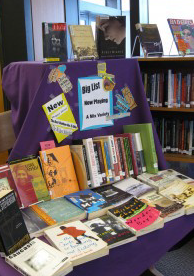 April 2011
April 2011
From time to time, students submit suggestions that the library add more popular fiction books. We try to add fiction, but it is a low priority for us since we are here primarily to support the college curriculum. We mainly try to collect those titles that are both popular and also seem like they will have lasting value as literature. Here are some other options: 1. Check out the Popular Reading Display on the main floor of the library (near the New Books – see map). 2. On the third floor of the library, try looking under call numbers like 811 (poetry), 812 (drama/plays), and 813 (fiction – 813.54 has quite a few). 3. You can get many popular titles through E-ZBorrow, which allows you to request books from over 50 academic libraries. The books will usually arrive in 2-5 business days. 4. Visit one of the many branches of the Carnegie Library of Pittsburgh. They have a wonderful selection of fiction, along with audiobooks, movies, magazines, and much more. Chatham students are eligible for a library card – see the information located here. Have a suggestion for the library? Submit it using our online form, or drop it in the Library Suggestion Box on the main floor of the library (to the left of the elevator).


April’s book display has a focus on the Greek myth The Rape of Persephone. The myth is layered and complex. All at once it serves in reveling the underlying connections in the human experience, explaining the change in seasons and cycle of life, offering an archetype to the mother-daughter relationship, and relating a story of the female rite of passage into adulthood. While ancient Greek society was strongly patriarchal, the myths and stories familiar to its people acknowledged the female divine and gave room for women to celebrate and honor their femininity and their experiences as women . Popular interpretation has the return of life in the spring time to correspond with the reunion of Persephone and Demeter. The myth of Persephone was tied religiously with the cult of Demeter and the Eleusinian mysteries. Growing out of the agrarian cults that honored Demeter as the goddess of the harvest, the rituals of the mysteries eventually developed into initiations in which participates believed in a reward in the afterlife. Some scholars believe this to be the seeds of Christianity in Rome and Greece. It is believed that this myth dates back much further than its first recorded version in Hesiod’s Theogony, and it still continues to endure today. Many artists, poets, and writers have interpreted this story for its power and mystery. A recent offering is using the myth as an aspect of eco-feminism. eco-feminism as part of the Food Studies curriculum. Chatham offers a graduate course in Stop by the library to today to learn more!
Commenting on blog posts requires an account.
Login is required to interact with this comment. Please and try again.
If you do not have an account, Register Now.